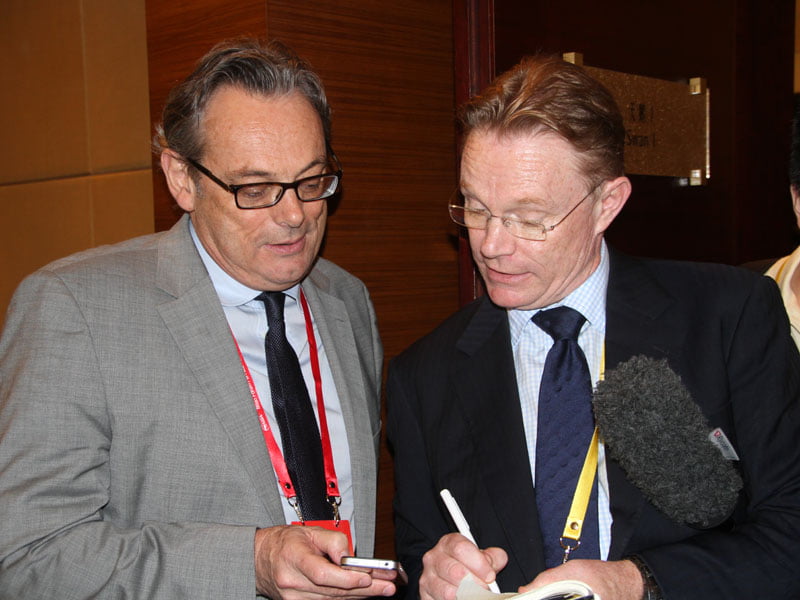Australia’s former Ambassador to China Geoff Raby is now chairman of Australian technology firm Smartrans Ltd amongst a raft of other, mainly China related, board positions, but cautions that the country he has adopted as home for now, is a “difficult place to do business”.
Being an Ambassador and a former Ambassador, especially one with a PhD in economics and strong background in trade policy – Raby was once Australia’s Ambassador to the Organisation of Economic Co-operation and Development in Paris – gives one certain amount of cachet in both Australia and more importantly China. And Raby has used it well.

Raby took the unusual step for a senior Australian envoy of staying on in Beijing after his four and half-year term ended in August 2011, setting up Geoff Raby & Associates. He has become almost the de-facto go to person for the Australian media on China, especially on the subject of business with China.
For anyone doing business in China, Raby said, “you still have to struggle. If you are a listed company there is so much complexity and you will need to initially burn shareholders money.”
Smartrans, which makes platforms and applications for mobile phone companies and service providers, is a rare Australian company that has managed to succeed in China.
“But it took the company six years of doing the hard yards,” Raby explained to InnovationAus.com. “That’s about right; people should give themselves six years or so.”
And while he was initially uncertain about the group as it was slightly outside of his immediate experience, he is now a certified technology advocate.
“There is lots of opportunity for Australia in technology in Asia, in all sectors,” Raby said.
“Think about agriculture. People in Shanghai are prepared to pay $8 a litre for Australian milk because it’s safe. Behind that safe milk is a massive amount of technology, that’s something we are very good at and there is an enormous opportunity there.”
Raby said this is an example of other sectors, like water treatment and the built environment, where smart new technologies can make a difference to developing countries like China.
“And then there are services – that’s now 50 per cent of the Chinese economy. It’s where Australia has expertise and it’s a huge opportunity,” he added.
“It’s an opportunity all across Asia”
As diplomats do, Raby has worked for a long time with both sides of politics, so it’s hardly surprising that he also knows Australia’s new Prime Minister Malcolm Turnbull and his family well. Well enough to have been invited to the former journalist, lawyer and investment banker’s home on Sydney’s harbour.
Turnbull has visited China a great many times, stretching back to the zinc mine he cranked up with former New South Wales Premier, and one of his key mentors in business, Neville Wran.
“He seems to have been around China forever,” Raby said. Turnbull’s son Alex – who has followed him into investment banking and last year left his dad’s old firm, Goldman Sachs, to start a hedge fund in Singapore – is married to Beijing local Yvonne Chang and, according to Raby, speaks “excellent” Putonghua (Mandarin).
Raby said Turnbull’s interests in China are broad. “There’s family, and business of course, people like him have an unbelievable range of contacts but I have also introduced him to an artist that I know (Raby is something of a China art buff and collector), he’s interested in all sorts of things.”
As for Smartrans, Raby and his board and Shanghai-based chief executive, Bryan Carr, are already laying plans to expand into other Asian markets.
Raby is keen to talk up the Philippines, where he has experience via Asiana Gold, an Australian Securities Exchange listed-mining group, of which he is a director.
“I think one of the most interesting opportunities for Australia is the Philippines it has a growing middle class, something like the rule of law and is more politically certain than somewhere like Malaysia,” Raby said, adding that Thailand was another country the group was keen to explore in the near future.
Australia will have a new Ambassador to China by the end of the year in the person of Jan Adams, one of the Deputy Secretaries in the Department of Foreign Affairs and Trade. Raby wouldn’t comment but given their similar backgrounds (both are trade wonks and spent time working at the OECD), you get the feeling he would be pleased.
Do you know more? Contact James Riley via Email.

